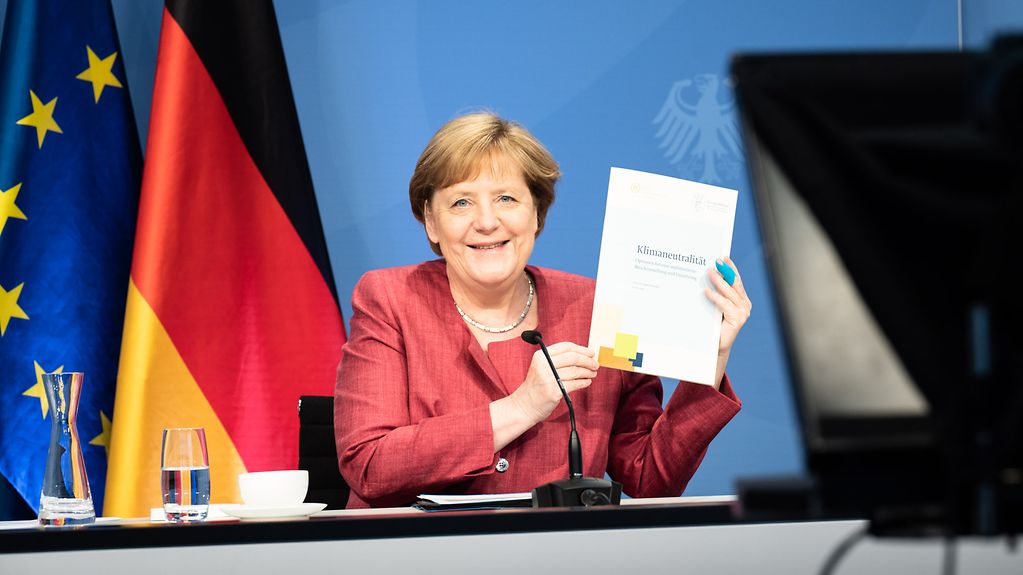Annual meeting of the German Council for Sustainable Development
“We must make the 2020s a decade of sustainability,” declared Chancellor Angela Merkel at the 20th annual meeting of the German Council for Sustainable Development, to ensure that we are not living today at the expense of future generations.
4 min reading time

The Chancellor at the online annual meeting of the German Council for Sustainable Development. The position paper, published jointly with the German National Academy of Sciences – Leopoldina, sets out the most important steps needed to achieve climate neutrality by 2050.
Photo: Bundesregierung/Steins
“Around the globe, we are living at the expense of the younger generations and the generations to come. That is simply the depressing truth. We must draw the correct conclusions and make the 2020s a decade of sustainability,” said Chancellor Angela Merkel on Tuesday at the online 20th annual meeting of the German Council for Sustainable Development. Its motto was “The dawn of a decade of sustainability”.
In terms of climate action and the conservation of natural resource the Chancellor stressed in her address, “The costs of failing to act, or of doing too little, already outstrip the costs of taking the action required. What we have done so far is simply not enough.” What we do, or fail to do now is the legacy we will leave our children.
Many convincing proposals
The Chairman of the German Council for Sustainable Development, Dr Werner Schnappauf, presented the Chancellor with a paper on climate neutrality, compiled jointly by the Council and the German National Academy of Sciences - Leopoldina.
Since she took office, the Chancellor has been invited every year to attend the annual meetings of the German Council for Sustainable Development. This year marked the last meeting she will attend in her capacity as Chancellor. She thanked the Council for the many "convincing proposals" it has made during this time and congratulated it on its anniversary. The Chancellor joined the meeting by video link and stressed the importance of inter-ministerial cooperation on sustainability policy in her 20-minute address.
The German Council for Sustainable Development is an independent council of experts, which supports and advises the Federal Government on matters relating to sustainable development. It was first appointed by the Federal Government in 2001. The members of the council are appointed for a three-year term of office by the Chancellor. They are public figures from different spheres.
Setting course for climate neutrality
To achieve climate neutrality, a fundamental change of course is needed, underlined the Chairman of the German Council for Sustainable Development, Dr Werner Schnappauf. “For decarbonising industry alone, we will need up to four times the energy we currently generate from renewable sources,” he declared. This illustrates the speed at which renewables will need to be developed in the years ahead, including work to extend electricity transmission grids.
Chancellor Angela Merkel said that the Federal Government is responding immediately to the ruling of the Federal Constitutional Court and that it has decided on important amendments to the Climate Change Act (Klimaschutzgesetz), with even more ambitious goals. “By 2045, greenhouse gas emissions are to be reduced to a level that will allow us to achieve net greenhouse gas neutrality. The annual reduction targets as of 2030 provide a clear path for reductions in the following years,” the Chancellor added.
Emerging from the pandemic under the banner of sustainability
The Federal Government is following the advice of the German Council for Sustainable Development to start to think now about the lessons we have learned from the pandemic. “That means that we shouldn’t be happy simply to return to the pre-pandemic state, but that we must do all we can to use the economic and social recovery from the pandemic to make the way we live, do business and work more innovative, more digital, more resilient, more climate-friendly – and thus more sustainable overall,” stated the Chancellor. “For this we will need to have the courage to embrace genuine transformation.”
Long-term investment will be essential. Last year, a package worth several billion euros was launched, added Angela Merkel. “This was made possible in no small way by the sound budgetary policy in the years leading up to the pandemic, which gave us the leeway to provide assistance to alleviate acute needs in the face of the crisis as well as investing in the future.”
Strategy important for sustainable political action
In March 2021 the Cabinet adopted the new updated Sustainable Development Strategy. It was preceded by two phases of dialogues held since 2019, in which a great many people got involved. The Chancellor thanked everyone “who has contributed to the further development of the strategy with their suggestions and ideas.”
The strategy identifies objectives and measures relating to all 17 of the Sustainable Development Goals laid out in the 2030 Agenda for Sustainable Development.
“The Sustainable Development Strategy proves that sustainable development has never before been so broadly and so deeply anchored in our policies,” the Chancellor noted. It had to be updated though, because some of the indicators set out in the strategy are not doing so well, and there is a risk the objectives might not be achieved.